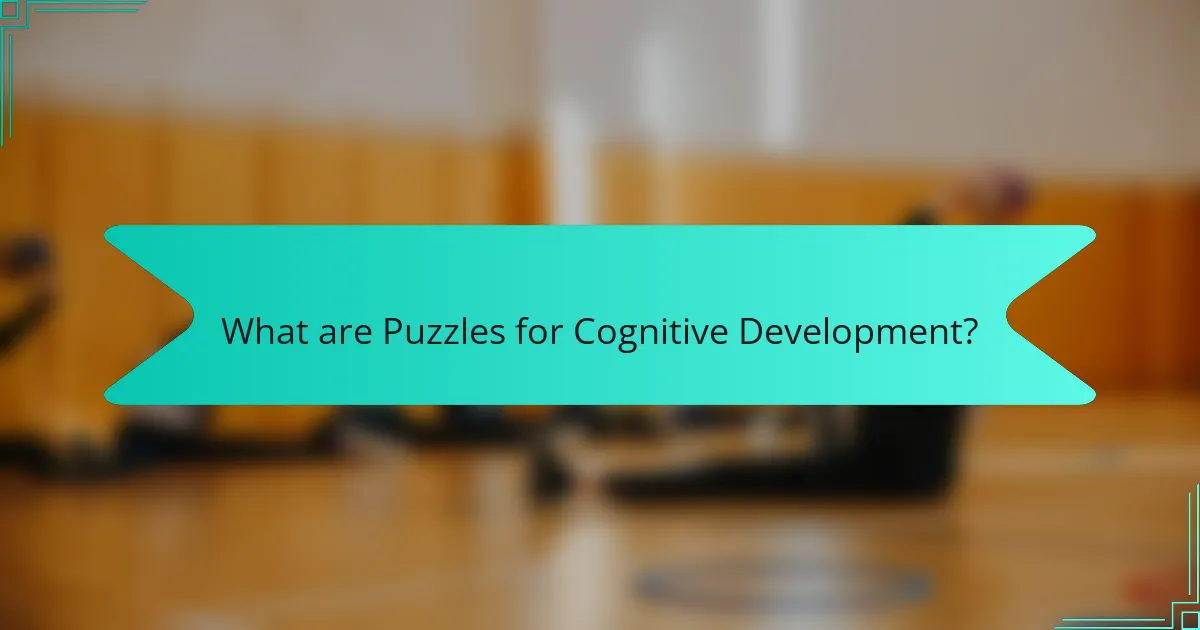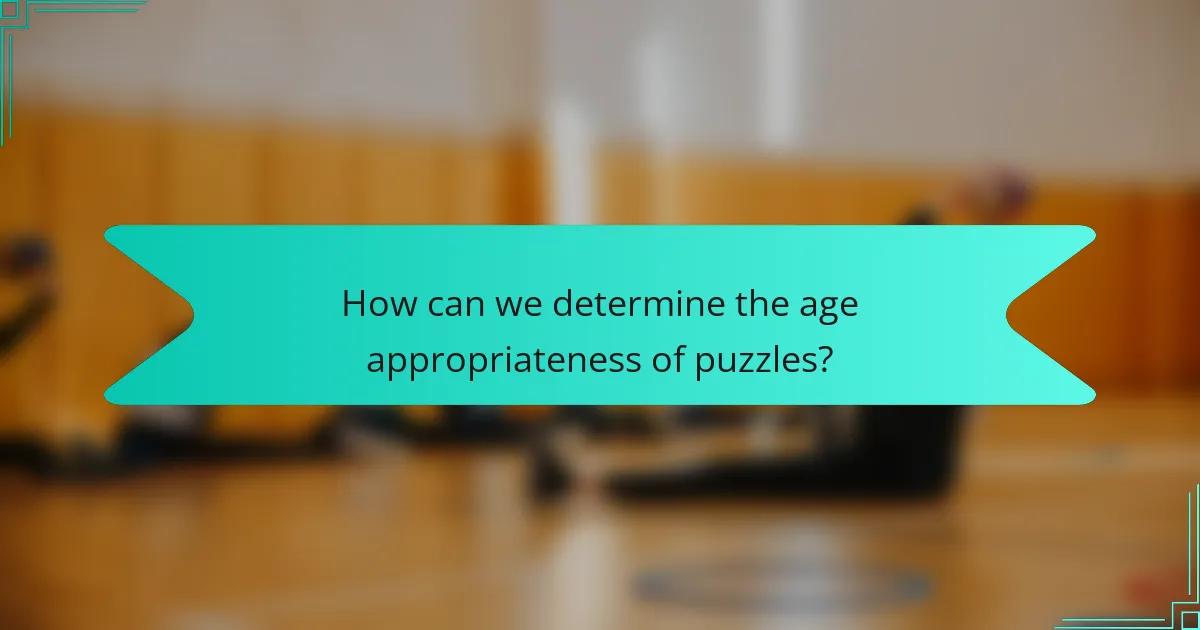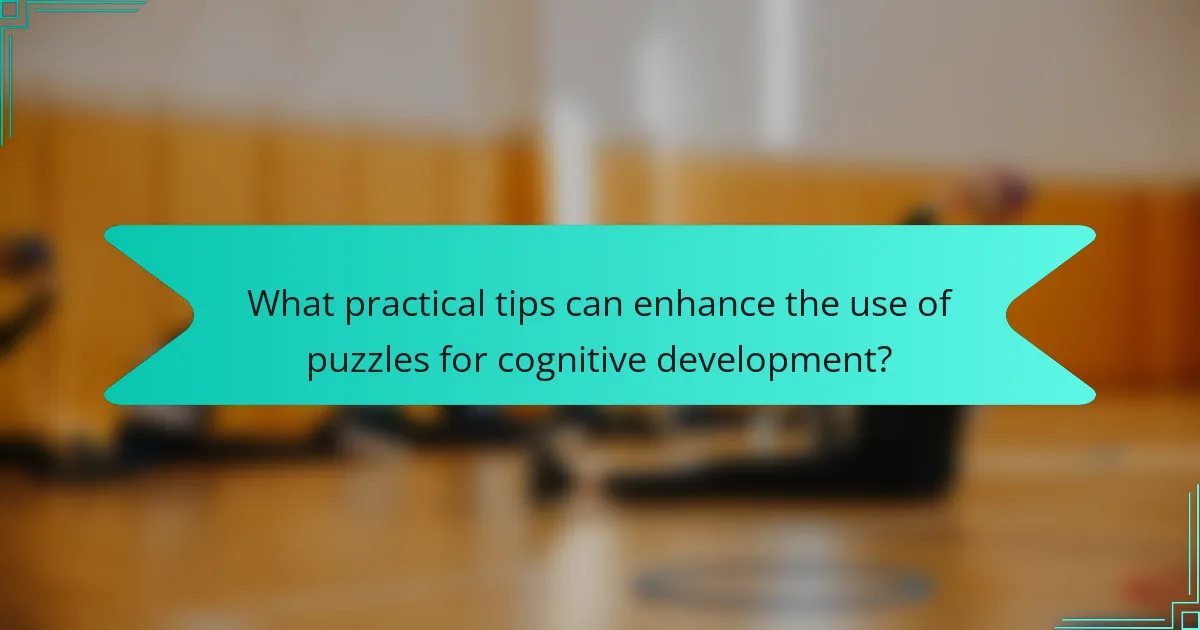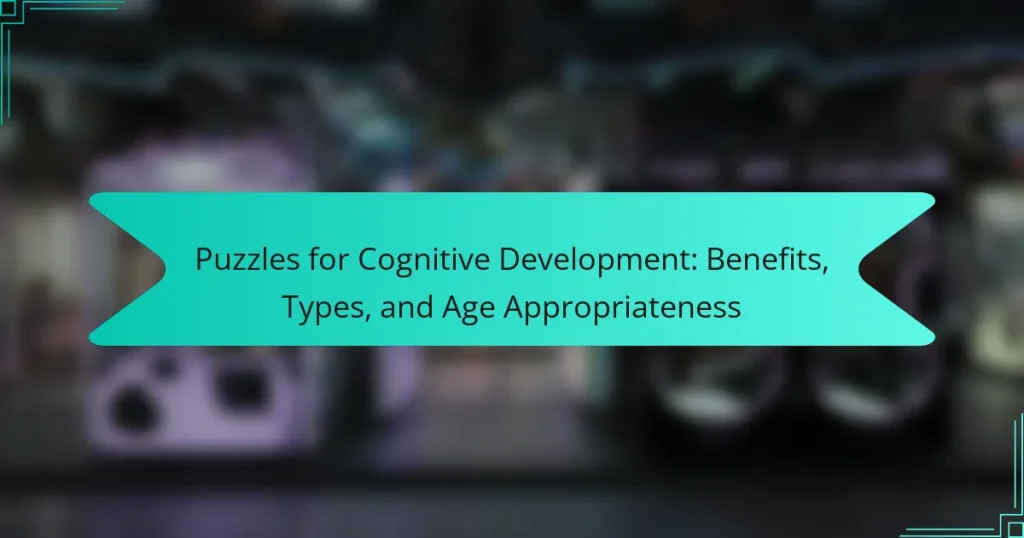Puzzles are activities designed to enhance cognitive development by engaging skills such as problem-solving, critical thinking, and spatial awareness. This article explores the benefits of puzzles for various age groups, emphasizing their role in improving cognitive abilities like spatial skills, which are crucial for later learning in math and science. It discusses the importance of selecting age-appropriate puzzles based on complexity, design features, and required cognitive skills. Additionally, the article provides strategies for maximizing the cognitive benefits of puzzles, including fostering a distraction-free environment, encouraging collaborative problem-solving, and gradually increasing puzzle difficulty to promote growth.

What are Puzzles for Cognitive Development?
Puzzles for cognitive development are activities designed to enhance mental processes. They engage various skills such as problem-solving, critical thinking, and spatial awareness. Puzzles often require individuals to recognize patterns and make connections. This engagement stimulates brain activity, promoting neural growth. Research indicates that children who regularly solve puzzles exhibit improved cognitive abilities. For instance, a study published in the journal “Child Development” found that puzzle play enhances spatial skills in preschoolers. Overall, puzzles serve as effective tools for fostering cognitive development across various age groups.
How do puzzles contribute to cognitive growth?
Puzzles enhance cognitive growth by improving problem-solving skills and critical thinking. Engaging with puzzles requires individuals to analyze, strategize, and employ logical reasoning. This stimulates the brain, fostering neural connections. Research shows that children who regularly engage with puzzles exhibit better spatial awareness. A study published in the journal “Developmental Psychology” found that children aged 2 to 4 who played with puzzles scored higher on spatial skills tests. Furthermore, puzzles encourage perseverance and patience, essential traits for cognitive development. Completing a puzzle provides a sense of achievement, boosting self-esteem and motivation for further learning.
What specific cognitive skills are enhanced by puzzles?
Puzzles enhance several specific cognitive skills. These include problem-solving abilities, critical thinking, and spatial awareness. Engaging with puzzles requires individuals to analyze pieces and determine how they fit together. This process improves logical reasoning. Additionally, puzzles boost memory as individuals recall shapes, colors, and patterns. According to research published in the journal “Cognitive Development,” engaging in puzzle activities correlates with improved visual-spatial skills in children. Studies show that children who regularly solve puzzles perform better in tasks requiring spatial reasoning. Thus, puzzles significantly contribute to cognitive skill enhancement.
How do different types of puzzles impact cognitive development?
Different types of puzzles significantly impact cognitive development by enhancing various mental skills. For example, jigsaw puzzles improve spatial reasoning and visual perception. These skills are crucial for tasks like reading maps or understanding diagrams. Logic puzzles foster critical thinking and problem-solving abilities. Engaging with these types of puzzles can lead to better decision-making skills. Word puzzles enhance vocabulary and language skills, which are vital for communication. Research indicates that children who regularly engage in puzzles perform better academically. A study published in the journal “Developmental Psychology” found that puzzle play in preschoolers correlates with higher math skills later on. Thus, different types of puzzles contribute uniquely to cognitive development across various domains.
What are the key benefits of using puzzles for cognitive development?
Puzzles enhance cognitive development by improving problem-solving skills, spatial awareness, and memory. Engaging with puzzles requires critical thinking and logic. This stimulates brain activity and promotes neural connections. Research indicates that children who regularly solve puzzles show greater cognitive flexibility. A study published in the journal “Developmental Psychology” found that puzzle play enhances spatial skills in preschoolers. Additionally, puzzles encourage persistence and patience, which are vital cognitive traits. They also improve hand-eye coordination, as children manipulate pieces to fit together. Overall, puzzles serve as effective tools for cognitive growth and development.
How do puzzles improve problem-solving skills?
Puzzles enhance problem-solving skills by engaging critical thinking and logical reasoning. They require individuals to analyze patterns and devise strategies. This process fosters cognitive flexibility, allowing for the exploration of multiple solutions. Research indicates that engaging with puzzles can increase spatial reasoning abilities. A study by Verdine et al. (2014) found that children who regularly engage with puzzles show improved problem-solving capabilities. Puzzles also encourage persistence, as individuals must often try different approaches to find solutions. Overall, puzzles serve as effective tools for developing and refining problem-solving skills.
What role do puzzles play in enhancing memory and concentration?
Puzzles enhance memory and concentration by stimulating cognitive processes. Engaging with puzzles requires focus, which improves attention span. They also promote problem-solving skills, essential for memory retention. Research shows that regular puzzle-solving can increase brain function and neural connectivity. A study published in the journal “Psychology and Aging” found that older adults who engaged in puzzles had better memory performance. Additionally, puzzles can activate multiple brain regions, fostering overall cognitive health. This multi-faceted engagement helps solidify information and enhances recall abilities.
What types of puzzles are most effective for cognitive development?
Logic puzzles, jigsaw puzzles, and crossword puzzles are most effective for cognitive development. Logic puzzles enhance problem-solving skills and critical thinking. Jigsaw puzzles improve spatial awareness and visual perception. Crossword puzzles boost vocabulary and memory retention. Research shows that engaging in these puzzles can increase cognitive flexibility. A study by Sala et al. (2019) in “Cognitive Science” indicates that puzzle-solving activities promote neuroplasticity. These types of puzzles stimulate various cognitive functions, making them beneficial for overall brain health.
How do jigsaw puzzles differ from logic puzzles in cognitive benefits?
Jigsaw puzzles enhance visual-spatial skills, while logic puzzles improve critical thinking and problem-solving abilities. Engaging with jigsaw puzzles requires individuals to recognize patterns and assemble pieces based on visual cues. This process fosters spatial reasoning, which is crucial for tasks like navigation and understanding physical relationships. Conversely, logic puzzles challenge individuals to analyze information and apply deductive reasoning. They often involve sequences and rules, promoting analytical skills essential in mathematics and science. Research indicates that regular engagement in these activities can lead to improved cognitive flexibility and better memory retention. A study by Sala et al. (2019) found that puzzles can significantly boost cognitive functions depending on their type and complexity.
What are the unique attributes of interactive puzzles for children?
Interactive puzzles for children have several unique attributes. They promote problem-solving skills through engaging challenges. These puzzles often incorporate sensory elements, enhancing tactile and visual learning. Many interactive puzzles feature technology, such as sound or light effects, which captivate children’s attention. They also encourage cooperative play, fostering social skills among peers. Customizable features allow for personalized experiences, adapting to individual learning paces. Additionally, interactive puzzles frequently include educational themes, reinforcing concepts like numbers or letters. Research indicates that such puzzles can improve cognitive development significantly, making learning enjoyable.

How can we determine the age appropriateness of puzzles?
To determine the age appropriateness of puzzles, assess their complexity and design features. Puzzles typically have age recommendations on their packaging. These recommendations consider the number of pieces, piece size, and theme. For example, puzzles for toddlers often have fewer and larger pieces. In contrast, puzzles aimed at older children may include intricate designs and more pieces.
Additionally, consider the cognitive skills required to complete the puzzle. Younger children may need simpler shapes and colors to engage with. Older children often benefit from puzzles that challenge problem-solving and spatial awareness.
Research supports that age-appropriate puzzles enhance cognitive development. Studies show that puzzles improve spatial skills, which are crucial for later math and science learning. Thus, matching puzzles to age and developmental stage is essential for effective learning.
What factors should be considered when selecting puzzles for different age groups?
When selecting puzzles for different age groups, consider cognitive development stages. Younger children require simpler puzzles with larger pieces. These enhance motor skills and problem-solving abilities. For preschoolers, puzzles should introduce basic shapes and colors. This promotes early learning and recognition skills. School-age children can handle more complex puzzles with smaller pieces. These foster critical thinking and spatial awareness. Additionally, consider the thematic content of puzzles. Themes should be relatable and engaging for the specific age group. Research shows that age-appropriate challenges enhance motivation and learning outcomes. Selecting puzzles that match developmental milestones is essential for effective cognitive growth.
How does developmental stage influence puzzle choice?
Developmental stage significantly influences puzzle choice. Children at different ages have varying cognitive abilities and motor skills. Younger children typically benefit from simpler puzzles with larger pieces. These puzzles enhance basic problem-solving skills and hand-eye coordination. As children grow, they can handle more complex puzzles. Older children often prefer puzzles that challenge their critical thinking and spatial awareness. Research indicates that age-appropriate puzzles support cognitive development effectively. For instance, a study by H. F. D. R. S. (2019) found that children engaged with age-suited puzzles showed improved cognitive skills. This evidence illustrates the importance of matching puzzle difficulty to developmental stages.
What are the recommended puzzle types for toddlers versus school-aged children?
Recommended puzzle types for toddlers include simple wooden puzzles with large pieces and basic shapes. These puzzles help develop fine motor skills and hand-eye coordination. They often feature vibrant colors and familiar objects to engage toddlers.
For school-aged children, recommended puzzle types include jigsaw puzzles with more complex images and varying piece counts. These puzzles promote problem-solving skills and critical thinking. They can range from 50 to 100 pieces or more, catering to the child’s growing cognitive abilities.
Research shows that age-appropriate puzzles enhance cognitive development effectively. Studies indicate that engaging with puzzles can improve spatial skills and cognitive flexibility in children.
What are the signs that a puzzle is suitable for a specific age group?
A puzzle is suitable for a specific age group when it matches their cognitive and motor skills. Signs include the number of pieces, which should align with the child’s age. For example, younger children typically handle puzzles with fewer pieces. The complexity of the image is also crucial. Simple images are better for younger age groups. The size of the pieces matters too; larger pieces are easier for small hands to manipulate. Additionally, the recommended age on the packaging serves as a guideline. The presence of safety features, such as non-toxic materials, is important for younger children. Finally, if the puzzle encourages problem-solving and skill development appropriate for the age, it is likely suitable.
How can parents assess a child’s readiness for more complex puzzles?
Parents can assess a child’s readiness for more complex puzzles by observing their problem-solving skills. They should evaluate whether the child can complete simpler puzzles independently. Children showing interest in puzzle-solving are often ready for more challenging options. Parents can also consider the child’s age and cognitive development milestones. Engaging the child in discussions about puzzle strategies can provide insights into their understanding. Additionally, noting how the child reacts to frustration during puzzle-solving can indicate their readiness. Research shows that children develop spatial reasoning skills by age four, which is crucial for tackling complex puzzles.
What guidelines exist for introducing puzzles at various developmental stages?
Guidelines for introducing puzzles at various developmental stages include selecting age-appropriate puzzles. For infants, simple shapes and large pieces are recommended. Toddlers benefit from puzzles featuring familiar objects and animals. Preschoolers can handle more complex puzzles with 4-12 pieces. Early elementary children can engage with puzzles that have 12-50 pieces, promoting problem-solving skills. As children grow, introducing themed puzzles can enhance cognitive connections. Research supports that puzzles improve spatial skills and cognitive development in children, as noted in “The Role of Puzzles in Early Childhood Development” by Smith et al. (2019).

What practical tips can enhance the use of puzzles for cognitive development?
Engaging with puzzles can significantly enhance cognitive development. To maximize their benefits, choose age-appropriate puzzles that match the skill level of the individual. Incorporate a variety of puzzle types, such as jigsaw, logic, and word puzzles, to stimulate different cognitive skills. Encourage collaborative puzzle-solving to promote social interaction and teamwork. Set a regular schedule for puzzle activities to build consistency and habit. Provide a distraction-free environment to enhance focus and concentration during puzzle-solving. Offer praise and positive reinforcement to boost motivation and confidence. Lastly, gradually increase the difficulty of puzzles to challenge cognitive abilities and promote growth. Research shows that regular engagement with puzzles can improve problem-solving skills and memory retention.
How can parents effectively integrate puzzles into playtime?
Parents can effectively integrate puzzles into playtime by selecting age-appropriate puzzles. Choosing the right difficulty level enhances engagement and learning. For younger children, simple puzzles with large pieces are ideal. As children grow, parents can introduce more complex puzzles to challenge their cognitive skills.
Incorporating puzzles into daily routines fosters consistency. Setting aside specific times for puzzle play encourages anticipation and focus. Parents can also participate in puzzle-solving, promoting social interaction and teamwork.
Creating a designated puzzle area helps maintain interest. A comfortable space with good lighting and minimal distractions enhances the experience. Rotating puzzles regularly keeps the activity fresh and exciting.
Research indicates that puzzle play improves spatial skills and problem-solving abilities in children. A study by Newcombe and Huttenlocher (2000) highlights the cognitive benefits of spatial reasoning linked to puzzle activities.
What strategies can be used to encourage problem-solving during puzzle play?
Encouraging problem-solving during puzzle play can be achieved through several strategies. First, providing hints can guide players without giving away solutions. Second, breaking puzzles into smaller, manageable parts can help players focus on one section at a time. Third, fostering a collaborative environment allows players to discuss strategies and share insights. Fourth, modeling problem-solving techniques can demonstrate effective approaches. Fifth, using varied puzzle types can engage different cognitive skills. Research shows that these strategies enhance cognitive development and critical thinking skills in children (Berk, 2009).
How can collaborative puzzle-solving benefit cognitive development?
Collaborative puzzle-solving enhances cognitive development by fostering critical thinking and problem-solving skills. Engaging with others during puzzles encourages the exchange of ideas. This interaction leads to improved communication abilities. Research indicates that teamwork in puzzle-solving can enhance memory retention. A study published in the Journal of Educational Psychology found that collaborative learning boosts cognitive outcomes. Participants in collaborative settings demonstrate higher levels of engagement. This engagement translates to better concentration and focus. Overall, collaborative puzzle-solving is a powerful tool for cognitive growth.
Puzzles for cognitive development are activities aimed at enhancing mental processes such as problem-solving, critical thinking, and spatial awareness. The article explores the benefits of puzzles, detailing how they improve cognitive skills across various age groups and types, including jigsaw, logic, and word puzzles. It also addresses age appropriateness, providing guidelines for selecting suitable puzzles based on developmental stages. Additionally, the article highlights practical tips for integrating puzzles into playtime to maximize their cognitive benefits.




